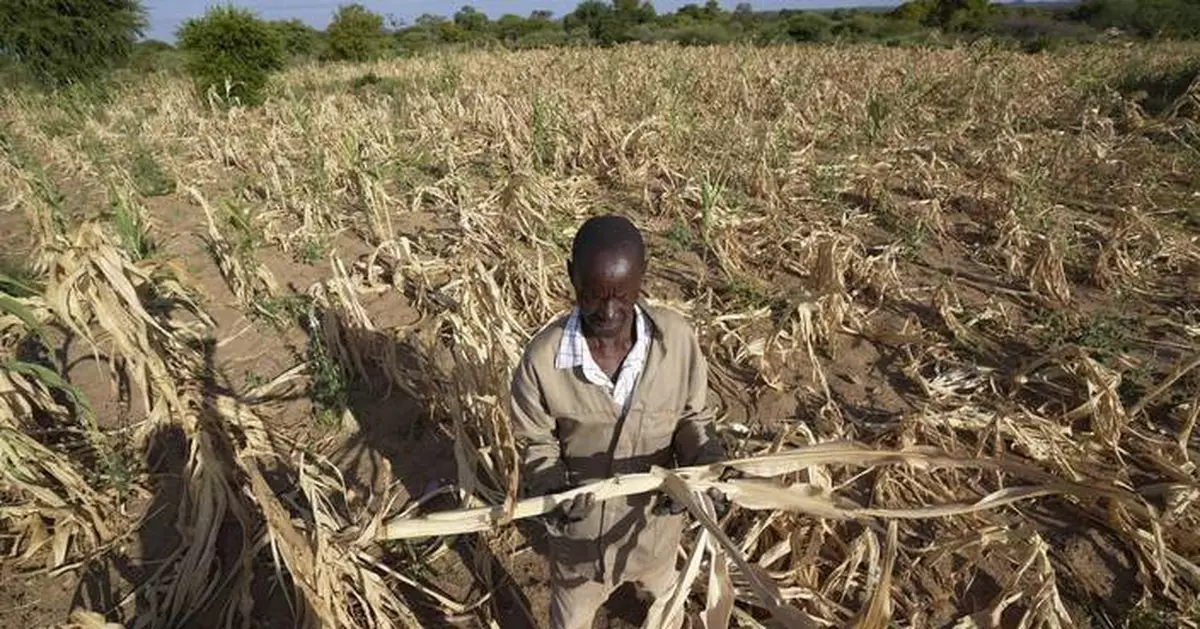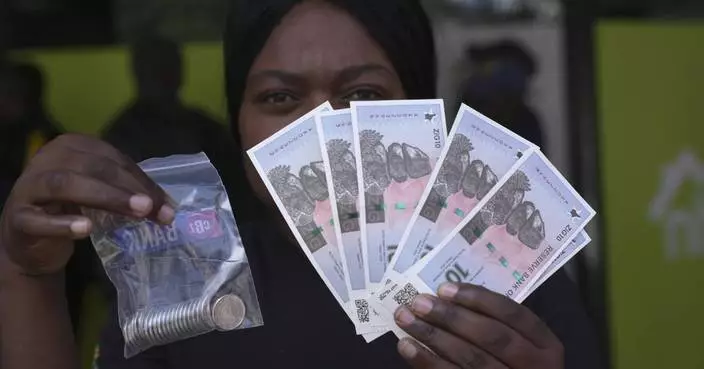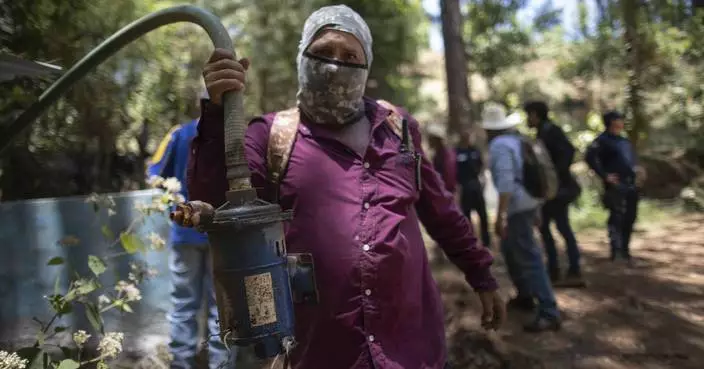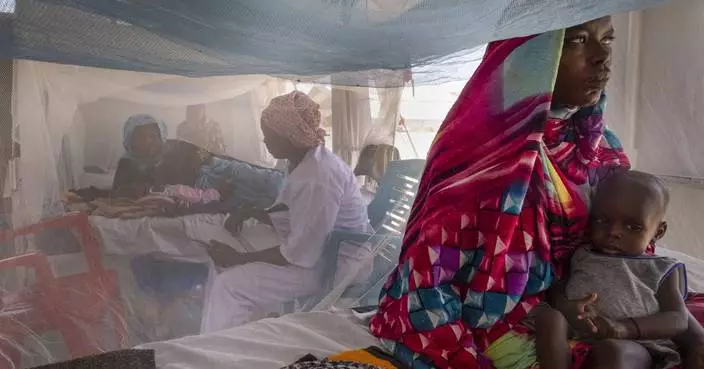HARARE, Zimbabwe (AP) — Zimbabwe declared a state of disaster Wednesday over a devastating drought that's sweeping across much of southern Africa, with the country’s president saying it needs $2 billion for humanitarian assistance.
The declaration was widely expected following similar actions by neighboring Zambia and Malawi, where drought linked to the El Nino weather phenomenon has scorched crops, leaving millions of people in need of food assistance.
“Due to the El Nino-induced drought … more than 80% of our country received below normal rainfall," President Emmerson Mnangagwa said in a speech calling for international aid. The country's top priority, he said, is "securing food for all Zimbabweans. No Zimbabwean must succumb to, or die from hunger.”
He appealed to United Nations agencies, local businesses and faith organizations to contribute towards humanitarian assistance.
El Nino, a naturally occurring climatic phenomenon that warms parts of the Pacific Ocean every two to seven years, has varied effects on the world’s weather. In southern Africa, it typically causes below-average rainfall, but this year has seen the worst drought in decades.
In Zimbabwe, the United Nations’ World Food Program has already rolled out a food assistance program targeting the 2.7 million people, nearly 20 percent of the country’s population, from January to March.
The first few months of the year are traditionally known as the “lean period,” when households run short as they wait for the new harvest. However, there is little hope for replenishing food stores this year, and Mnangagwa said that even more people than previously forecast will likely need food aid.
More than 60% of Zimbabwe’s 15 million people live in rural areas, growing the food they eat, and sometimes small surpluses that can be sold to cover expenses such as school fees. With relatively little participation in the cash economy, many of those won’t be able to buy food even when it's available in markets.
Zimbabwe, once a regional agricultural powerhouse and grain exporter, has in recent years relied more and more on aid agencies to avert mass hunger due to extreme weather conditions such as heat waves and floods.
Mnangagwa’s declaration will open the way for aid agencies to mobilize international support for more aid, but many people may still fail to get assistance, which is likely to be targeted to the most vulnerable populations due to limited resources amid a global hunger crisis and a cut in humanitarian funding by rich governments.
Much of Southern Africa is in the throes of a food crisis due to the ongoing drought. Zimbabwe declared a state of national disaster and appealed for humanitarian assistance from international donors in 2019, after a failed crop left tens of thousands in need.
Zambian President Hakainde Hichilema declared the current drought a national disaster in February, saying that almost half of his country’s staple corn crop had been destroyed. According to the United Nations Children’s Fund, more than 6 million in Zambia, half of them children, have been affected by the drought.
Less than a month later, Malawian President Lazarus Chakwera said his country needed more than $200 million in urgent humanitarian assistance over a drought that he said has affected 2 million households in 23 of the tiny country’s 28 districts. The U.N. Children's Fund said about 9 million people, half of them children, need help in Malawi.
The United States Agency for International Development, the U.S. government’s foreign aid agency, has estimated through its Famine Early Warning Systems Network that 20 million people in southern Africa needed food relief between January and March.
These needs could extend into early 2025 for many people in areas of highest concern such as Zimbabwe, southern Malawi, parts of Mozambique and southern Madagascar due to El Nino, USAID said.

FILE - A young boy with a donkey cart arrives to receive food aid in Mangwe district in southwestern Zimbabwe, Friday, March, 22, 2024. Zimbabwe declared a state of disaster Wednesday, April 3, 2024, over a devastating drought that's sweeping across much of southern Africa, with the country’s president saying it needs $2 billion for humanitarian assistance. (AP Photo/Tsvangirayi Mukwazhi, File)

FILE - James Tshuma, a farmer in Mangwe district in southwestern Zimbabwe, stands in the middle of his dried up crop field amid a drought, in Zimbabwe, Friday, March, 22, 2024. Zimbabwe declared a state of disaster Wednesday, April 3, 2024, over a devastating drought that's sweeping across much of southern Africa, with the country’s president saying it needs $2 billion for humanitarian assistance. (AP Photo/Tsvangirayi Mukwazhi, File)
PARIS (AP) — Freshly cooked bread, select cheeses and a broad veggie offer will be among the meals to be offered to athletes and visitors during the 2024 Paris Olympics — including, of course, gourmet dishes created by renowned French chefs.
About 40,000 meals are expected to be served each day during the Games to the more than 15,000 athletes from 200 different countries housed at the Olympic village.
Visitors, too, will be able to enjoy some specially created snacks at the different venues.
French food services company Sodexo Live!, which was selected to oversee the catering at the athletes’ village and 14 venues of the Paris Games, said it has created a total of 500 recipes, which will notably be offered at a sit-down eatery for up to 3,500 athletes at the village, meant to be the “world's largest restaurant."
“Of course, there will be some classics for athletes, like pasta," said Nathalie Bellon-Szabo, global CEO of Sodexo Live! But the food will have a "very French touch.”
Athletes will also have access to “grab and go” food stands, including one dedicated exclusively to French cuisine cooked up by chefs.
Renowned French chef Amandine Chaignot, who runs a restaurant and a café-bistro in Paris, on Tuesday unveiled one of her recipes based on the iconic croissant.
“I wanted the recipe I suggested to be representative of the French terroir, but I wanted athletes to enjoy it at the same time,” she told the Associated Press. “It was quite obvious for me to make a croissant that I could twist. So, you have a bit of artichoke puree, a poached egg, a bit of truffle and a bit of cheese. It’s both vegetarian and still mouthwatering.”
Every day, during the July 26-Aug. 11 Games, a top chef — including some awarded with Michelin stars — will cook in front of the athletes at the Olympic Village, “so they’ll be able to chat and better understand what French cuisine is about — and to understand a bit of our culture as well,” Chaignot said.
Daily specials will be accompanied by a wide range of salads, pastas, grilled meat and soups. Cheeses will include top quality camembert, brie and sheep’s milk-based Ossau-Iraty from southwestern France.
The Olympic Village will also feature a boulangerie producing fresh baguettes and a variety of other breads.
“The idea is to offer athletes the chance to grab a piping hot baguette for breakfast," said baker Tony Doré, who will be working at the Olympic Village's main restaurant.
Athletes interested in other than sports, will even be able to participate in daily bakery trainings, and learn to make their own French baguette, said Doré.
In an effort to provide as many options as possible, meals offered will revolve around four cuisines: French, Asian, African and the Caribbean and international food.
Paris 2024 organizers have promised to make the Games more sustainable and environment-friendly — and that includes efforts to reduce the use of plastic. To this effect, the main restaurant at the village will use only reusable dishes.
Additionally, organizers say all meals will be based on seasonal products and 80% will come from France.
Plant-based food will represent 60% of the offer for visitors at the venues, including a “vegetarian hot-dog," said Philipp Würz, head of Food and Beverage for the Paris 2024 Committee.
There's “a huge amount of plant-based recipes that will be available for the general public to try, to experience and, hopefully, they will love it," said Würz.
The urban park at the Place de la Concorde, in central Paris, will offer visitors 100% vegetarian food — a first in the Games’ history. The place will be the stage for Paris 2024’s most contemporary sporting disciplines: BMX freestyle, 3x3 basketball, skateboarding and breakdancing.
AP journalist Nicholas Garriga contributed to this report.
AP Olympics coverage: https://apnews.com/hub/2024-paris-olympic-games

Fish dishes, prepared by 3-star chef Alexandre Mazzia, are presented Tuesday, April 30, 2024 in Paris. Some 40,000 meals will be served each day during the Games to over 15,000 athletes housed at the Olympic village. (AP Photo/Michel Euler)

Twisted croissants with artichoke puree, a poached egg, a bit of truffle, and a bit of cheese, created by French chef Amandine Chaignot, are seen Tuesday, April 30, 2024 in Paris. Some 40,000 meals will be served each day during the Games to over 15,000 athletes housed at the Olympic village. (AP Photo/Michel Euler)

Chocolate breads made by French baker Tony Dore and that will be served during the. Olympic Games are seen Tuesday, April 30, 2024 in Paris. Some 40,000 meals will be served each day during the Games to over 15,000 athletes housed at the Olympic village. (AP Photo/Michel Euler)

French chef Amandine Chaignot, of the restaurant "Pouliche", who will prepare food for athletes during the Olympic Games, answers questions Tuesday, April 30, 2024 in Paris. Some 40,000 meals will be served each day during the Games to over 15,000 athletes housed at the Olympic village. (AP Photo/Michel Euler)
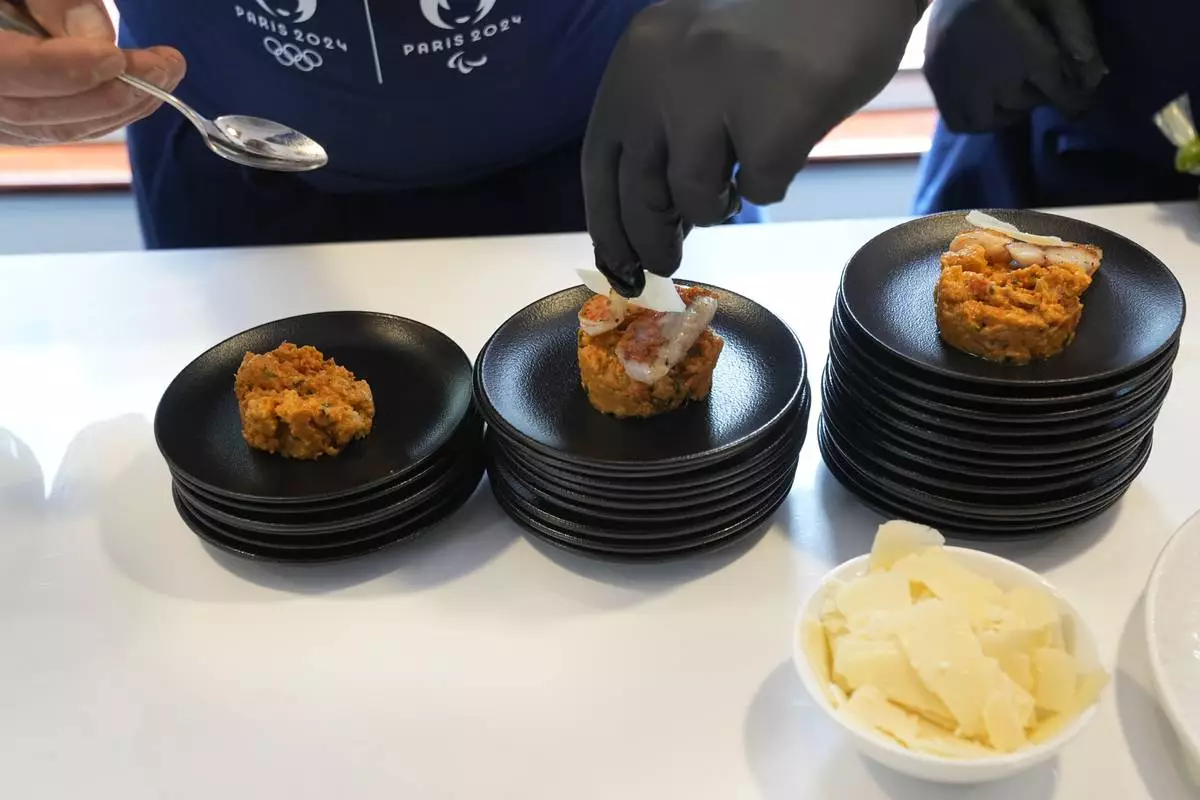
A bread salad made by chef Stephane Chicheri is presented Tuesday, April 30, 2024 in Paris. Some 40,000 meals will be served each day during the Games to over 15,000 athletes housed at the Olympic village. (AP Photo/Michel Euler)

French baker Tony Dore prepares baguettes, like those that will be served during the. Olympic Games, Tuesday, April 30, 2024 in Paris. Some 40,000 meals will be served each day during the Games to over 15,000 athletes housed at the Olympic village. (AP Photo/Michel Euler)




